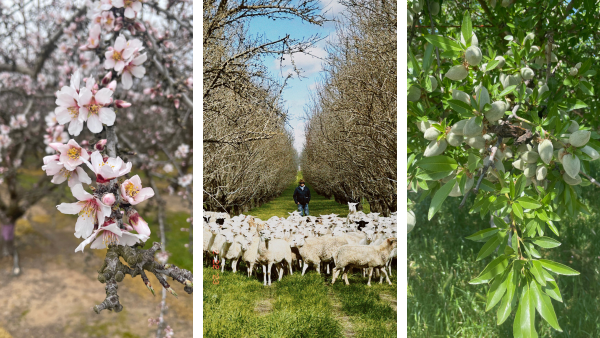Project updates:
4/22/2025
Exploring Integrated Crop-Livestock Systems at the 2025 EcoFarm Conference
The OREI Orchard Grazing team is excited to lead an insightful workshop at the 2025 EcoFarm Conference titled Integrated Crop-Livestock Systems (ICLS) in Diverse Crop Production. Organized by Dr. Alda Pires and featuring Dr. Amélie Gaudin as a key speaker, this session will delve into the benefits, challenges, and innovations of combining livestock and crop production.
ICLS leverages livestock to graze crop residues and cover crops, enhancing farm sustainability by improving soil health, reducing pests and weeds, and increasing nutrient density in crops. The workshop will cover:
- Good agricultural practices for integrating livestock into cropping systems.
- Food safety mitigation strategies in diverse agricultural settings.
- Soil health benefits from reduced nitrate leaching and enhanced fertility.
Attendees will gain insights from cutting-edge multi-state research and hear firsthand experiences from farmers successfully implementing ICLS in orchards and vegetable production systems. Featured speakers include:
- Dr. Amélie Gaudin, University of California, Davis
- Rosie Burroughs, Burroughs Family Farms, Denair, CA
- Rye Muller, Full Belly Farm, Guinda, CA
Join us to explore how ICLS can contribute to more sustainable, productive, and resilient farming systems.
02/04/2025
We’re excited to share the latest progress on our research into livestock integration and cover crop grazing in organic nut orchards across California! Field trials are now underway in eight orchards spanning three distinct regions, utilizing a randomized block design to ensure robust and reliable results.
In Fall 2024, our talented team of researchers from the Pires, Gaudin, and Wilson labs conducted comprehensive baseline field sampling. These efforts are laying the groundwork for three years of groundbreaking research aimed at unlocking the potential of these innovative practices. Our focus? Evaluating how livestock grazing on cover crops influences bacterial populations, soil health, pest management, and economic outcomes—all while prioritizing food safety.

What's Next?
In Spring 2025, our team will build on this foundation with detailed sampling efforts timed around grazing events:
- Pre- and Post-Grazing Sampling (Pires Lab): Soil and plant tissue will be collected before grazing begins and at key intervals after grazing (days 30, 90, 120, and 150).
- Soil Health Monitoring (Gaudin Lab): Soil samples will be analyzed seven days post-grazing to capture early changes in soil dynamics.
- Nut Remnant Studies (Wilson Lab): Remnant nuts will be collected both before and after grazing to evaluate pest management outcomes.
The Impact
This first-year data will be crucial in understanding the persistence of pathogens in soil, the role of remnant nuts in pest control, and the broader trade-offs and benefits to soil health. Our ultimate goal is to enhance the ecological and economic value of livestock integration while minimizing food safety risks in organic nut orchards.
Stay tuned for more updates as we work toward shaping a sustainable future for California’s organic agriculture!

